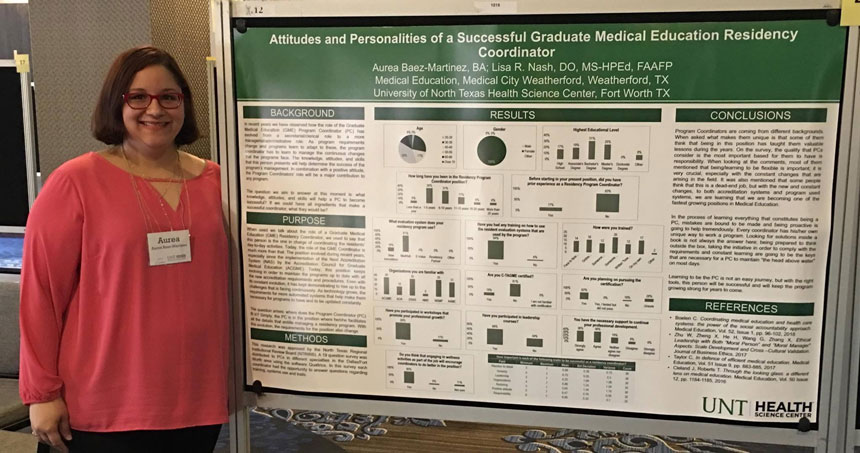GME Program Coordinator helps young doctors in residencies
When Aurea Baez-Martinez and her husband arrived in the United States with their daughter in January 2017, they had nothing but each other, a few clothes and a couple of toys for the little girl.
It was a big move for a family that had spent their entire lives in Puerto Rico, but a life-changing opportunity awaited Baez-Martinez at UNT Health Science Center, and she couldn’t pass it up.
Four days after arriving, Baez-Martinez started her new job as a Graduate Medical Education Program Coordinator with the Texas College of Osteopathic Medicine. She now serves as the GME Coordinator at Medical City Weatherford, where she helps young doctors in residencies cope with this phase of their medical education.
“The GME coordinator profession has grown substantially from originally just administrative duties to now being a crucial member of the program leadership team,” said Dr. Nash, Senior Associate Dean for Graduate Medical Education. “They serve as resident advocates and provide support to residents with connections to resources and problem resolution.”
Baez-Martinez spent nearly a decade in a similar position in a hospital in Puerto Rico. When she arrived in the United States, she already was considering pursuing TAGME certification, the Training Administrators of Graduate Medical Education program for GME coordinators.
“When I was talking with Dr. Nash about it before I got the job, she was like ‘go for it, do it,’ ” Baez-Martinez said. “She was so encouraging and supportive, and I loved that.”
The certification process isn’t easy. The TAGME assessment has grown and developed over many years, and the training administrator’s knowledge, skills, and abilities are assessed by a national standard.
Baez-Martinez still was trying to get her home life settled so she decided to wait to take the test. She took advantage of that time to attend workshops, obtain educational credits and prepare for the assessment.
By last month, she was ready and passed the assessment. With the certification, Baez-Martinez is ready to do more with residents in helping them on their journeys to becoming physicians, even if that means doing some unorthodox things.
“I tell them if they need someone to talk to, they can come to me,” she said. “I even had a couple of residents going through a difficult circumstance so I told them to come by my office. I told them if they needed to close the door, shout, scream or do whatever they need to do, I was there to be a refuge and to let them know I’m here to support them no matter what.”
Residents work long hours under stressful conditions. They rarely leave the hospital, many holidays are spent at the facility, and time with their immediate families is scarce. But Baez-Martinez wants them to consider her an extended part of their family.
“Aurea is one of those individuals who truly goes above and well beyond,” Dr. Nash said. “She manages to do it all in such a cheerful way that it’s really a pleasure to work with her. She has been a valuable part of our team.”







Social media